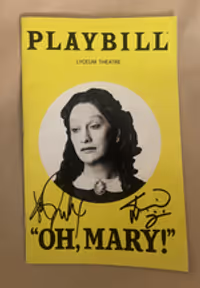The case against Stereophonic
JSquared2
Broadway Legend Joined: 3/23/17
#25The case against Stereophonic
Posted: 10/2/24 at 11:19pm
It’s only a matter of time before we have a David Adjmi/Jeff Marx collaboration.
#26The case against Stereophonic
Posted: 10/2/24 at 11:57pm
Some posters are conflating intellectual property violations with plagiarism, two very different issues. This feels like a fairly obvious case of only the second, or the suit would have no standing nor would it have reached the public arena. It may prove hard to pursue to verdict but it doesn’t seem gratuitous or frivolous.
#27The case against Stereophonic
Posted: 10/3/24 at 12:47am
Thoughts:
1. It is a fool's errand to try to analyze a lawsuit without having the answer. A complaint tells us what is the same; an answer tells us what is different. ( I broke my arm (really I did), but I would run from an orthopedic surgeons office if they told me what I had done before they had seen the imaging results. Patience, please.
2. This is a lawsuit that we might call Book vs. Play. The book rights holders have no claim against any violation of any rights of Fleetwood Mac or its constituent parts. (Nor does the lawsuit suggest otherwise.) That would be a Band vs. Play lawsuit, and it would have a far bumpier path to success.
3. The odds are not in Book's favor in any event. How much of the play can be connected to the book? And how much value did that portion add, when measured against (a) what was known about the band (that, incidentally, was expressly asserted to NOT be what the play was about) from other sources, and (b) the uniqueness (or lack thereof) of the knowledge imparted by the book. For instance, over a page of the complaint is devoted to comparing the photograph of the view from the control room in the book and a photograph purporting to show the same view in the play. If the defendant's lawyers wanted to show the meaninglessness of this comparison and hired you to find photos of views from control rooms on the internet (feel free to use AI to do the heavy lifting), how hard would that be and would you think that the book's photo revealed something unique?
4. I could keep going but I'll just add one more thing. The plaintiff's lawyers don't seem to have made much effort to think through the framing of their case, but they also did a real no-no in cases like this: they did not just sue the weak; they also sued the strong. Why? I think suing the Shuberts is something most folks who know how things work would avoid at all costs.
Anyway, buy your popcorn before the other show drops.
The Other One
Broadway Legend Joined: 4/1/08
#28The case against Stereophonic
Posted: 10/3/24 at 8:38am
Kad said: "BrodyFosse123 said: "This falls under the same scenario as The Supremes and DREAMGIRLS. There are enormous similarities to their career story from starting off as a sister/background act to The Primes (later The Temptations), to Florence Ballard (Effie White) being the group’s original lead singer being pushed into background singer status as Deena Jones (Diana Ross) is moved to lead spot to market the group to the pop music market. Then there’s the Diana Ross/Berry Gordy (Deena/Curtis) romance. Lots of other similarities as well."
There is a major difference here in that there was not one specific source that Dreamgirls drew from or that anyone claimed it drew from. The allegation here is that Adjmi used Ken Caillat's book as the primary source and adapted it, lifting details, scenarios, and even dialogue. Looking at some of the comparisons between Caillat's book and the Stereophonic script in the lawsuit, there does appear to be some similarity if not outright paraphrasing or slight rewording of specific quotes."
There are also a lot of differences between the reality of The Supremes and the story told in Dreamgirls. Florence never actually was a lead singer and was therefore never replaced as one by Diana Ross. Early recordings reveal that they had more of a group sound (there were originally four members) in which the harmonies were prominent, and each girl might sing her own verse in a song but Florence certainly wasn't more featured than anyone else. If anyone was it was Diana, though as I said there was more of a group sound. Florence (Save Me A Star, Buttered Popcorn) and Mary (Pretty Baby, Baby Don't Go) had their occasional lead vocals but none of them is a lost classic. There was also no relationship or even flirtation between Berry and Florence. He did not move on from her to Diana and no one ever had it in for her. She just grew increasingly unhappy with her demanding workload, not singing leads (Berry and songwriters Holland/Dozier/Holland did indeed decide that Diana had the most distinctive voice and would sing lead on all original songs) and constantly having to travel. So she started to skip rehearsals. And recording sessions. And in one case a live performance. And she drank. And expressed her resentment in no uncertain terms when the group's name was changed. Everyone was tired of dealing with her by the time she was booted, which could justifiably have happened months earlier but no one wanted to break up a unit that was so beloved by the public until they had no choice. And of course there was no reunion with The Supremes for her, no successful solo career because she stopped trying and kept drinking.
Dreamgirls may have been inspired by the story of The Supremes, but the book is its own original story. I expected something like that when I saw Stereophonic and was shocked by how literally it retold the story of Fleetwood Mac.
The actual story of The Supremes would make a great jukebox musical, play or most likely miniseries if anyone were to green light it.
akhoya87
Featured Actor Joined: 4/22/18
#29The case against Stereophonic
Posted: 10/3/24 at 9:13am
Just some random musings/speculation from someone who probably knows nothing:
- Like most copyright suits, this is probably about money. That's why you "sue the strong," as HogansHero put it. You name the deep pockets, especially where there's a case to be made for joint-and-several liability (which can be complicated in a copyright case).
- As Kad pointed out, this is about whether Stereophonic is an unauthorized adaptation of Caillat's book, not about whether Stereophonic is about Fleetwood Mac and infringes on the members' life rights.
- Like any good complaint, this Complaint probably cherry-picks the best lines of dialogue to demonstrate substantial similarity. Caillat may have pleaded enough to survive a motion to dismiss, but this case may be very tricky for him once fact discovery is over. You can't copyright phrases, you can't copyright events, and you can't copyright ideas.
- This probably isn't a parody, as Stereophonic's not really commenting on Caillat's book. Fair use is broader than parody, although certainly narrower post-Goldsmith v. AWF.
KevinKlawitter
Broadway Legend Joined: 1/21/20
#30The case against Stereophonic
Posted: 10/3/24 at 11:27am
One more touch for the "why now?" question - according to Amazon the script for Stereophonic is set to be published on the 29th of this month. Granted, these things get delayed all of the time, but if Caillat's team intends to get a settlement, get shared royalties, or get Adjmi to include a "based on" credit, timing the lawsuit to match the script's publication date could be a good way to hold their feet to the fire.
#31The case against Stereophonic
Posted: 10/3/24 at 1:23pm
akhoya87 said: "
- Like most copyright suits, this is probably about money. That's why you "sue the strong," as HogansHero put it. You name the deep pockets, especially where there's a case to be made for joint-and-several liability (which can be complicated in a copyright case)."
Just to explain where I am coming from... As a threshold matter, the case against the Shuberts is very very weak. Not a producer, just the landlord/licensor. J&S liability seems far-fetched. (I don't think you disagree.)
But they have more at stake here than anyone else, because holding them responsible for due diligence as to content (which would presumably imply an obligation, as an example, to monitor the evolution of that content) would have very major long term risks. So, because of the deep pockets, they would not be likely to settle, even if it costs them. The better question is how deep the plaintiffs' pockets (and/or their lawyers, who seem quite over their heads in this anyway) are.
We shall see what happens of course, bearing in mind that there are also deep pockets among some other named defendants.
akhoya87
Featured Actor Joined: 4/22/18
#32The case against Stereophonic
Posted: 10/3/24 at 10:12pm
HogansHero said: "akhoya87 said: "
- Like most copyright suits, this is probably about money. That's why you "sue the strong," as HogansHero put it. You name the deep pockets, especially where there's a case to be made for joint-and-several liability (which can be complicated in a copyright case)."
Just to explain where I am coming from... As a threshold matter, the case against the Shuberts is very very weak. Not a producer, just the landlord/licensor. J&S liability seems far-fetched. (I don't think you disagree.)
But they have more at stake here than anyone else, because holding them responsible for due diligence as to content (which would presumably imply an obligation, as an example, to monitor the evolution of that content) would have very major long term risks. So, because of the deep pockets, they would not be likely to settle, even if it costs them. The better question is how deep the plaintiffs' pockets (and/or their lawyers, who seem quite over their heads in this anyway) are.
We shall see what happens of course, bearing in mind that there are also deep pockets among some other named defendants."
No disagreement here. Did not mean to suggest that the case for joint-and-several liability was a particularly good one. Just explaining why a plaintiffs' lawyer might want to name the Shuberts, irrespective of the merits.
#33The case against Stereophonic
Posted: 10/3/24 at 11:52pm
ErmengardeStopSniveling said: "This is kinda drifting from the subject at hand, but a lot of rightsholdersreallyhate parody, because though it's fully legal, they have no control over it.
Like imagine if Disney had been in the process of adapting James Cameron's TITANIC into a stage musical, or if Celine Dion and her reps had been working on a catalogue musical about her life? Both those things might have less value for the stage now that TITANIQUE exists and is showing no signs of stopping. I can't imagine any of those parties are thrilled with the show.
TITANIQUE has a whole page on their website enumerating the licensing of all the music they use in the show. On top of that, artists have had songs featured in sometimes 3-4 different musicals - it might dilute the song, but not necessarily the artist’s brand.
https://newyork.titaniquemusical.com/music-licensing/
Ensemble1728039452
Swing Joined: 10/4/24
#34The case against Stereophonic
Posted: 10/4/24 at 12:02pm
PipingHotPiccolo said: "No idea what a life rights case would look like--- Fleetwood Mac are very much public figures, and their work product (ie songs, writings) are not being used.
I also am not sure where the law lands re biographical works. Could Hamilton sue LMM if he were alive? Chernow worked with LMM, sure, but if he hadnt, and LMM compiled Hamilton using history books--the very purpose of which are to teach/communicate historical facts-- im not sure how far that lawsuit would go so long as the work stuck to the historical narrative.
On the one hand, there is a fine line between inspiration and plagiarism, but if parts of Fleetwood Mac's memoir are indeed lifted verbatim, it sounds problematic. It makes me wonder how careful we all need to be when it comes to original work and sourcing. Even when writing a college essay, it's important to make sure your ideas are unique. This is why some students prefer to buy essays from reliable sources like https://essays.edubirdie.com/buy-essay to avoid unintentional plagiarism. I do this myself and can recommend this resource. It will be interesting to see how this case will develop!
Maybe Adjmi lifted whole sections of dialogue from these guys, in which case, yikes, but if you write a narrative tale about Fleetwood Mac, im not sure why someone else can use that history in his or her own artistic fashion. Not my area of the law, though."
I agree, it seems tricky. As long as the narrative sticks to public facts and not private life details, it feels hard to justify a lawsuit. Biographical works often rely on public domain info. Thanks for telling me about it!
chrishuyen
Broadway Legend Joined: 11/12/14
#35The case against Stereophonic
Posted: 10/4/24 at 3:39pm
So just to check my understanding (and this is a very simplified take), if Adjmi can prove that the specific events he uses aren't solely taken from the book (as in, they were reported on in other instances or well known outside of the book) then the plaintiff doesn't really have as much of a case?
#36The case against Stereophonic
Posted: 10/24/24 at 10:35pm
Stevie Nicks Has No Idea What Stereophonic Is
“What is that? Really? How in the world have I gotten this far without knowing about this?”
KevinKlawitter
Broadway Legend Joined: 1/21/20
Owen22
Broadway Legend Joined: 2/24/11
#38The case against Stereophonic
Posted: 12/4/24 at 8:29am
Did the Lorraine Hansbury estate ever have any problems with Clybourne Park? Even though this is a separate story (well, two separate stories) it uses a portion of the IP to establish it's base narrative. And there is even the use of a character from Raisin in the Sun....
#39The case against Stereophonic
Posted: 12/4/24 at 10:02am
Owen22 said: "Did the Lorraine Hansbury estate ever have any problems with Clybourne Park? Even though this is a separate story (well, two separate stories) it uses a portion of the IP to establish its base narrative. And there is even the use of a character from Raisin in the Sun...."
This article dates from 2012, so things may have changed, but Bruce Norris states no permission was sought. Since his play doesn’t use any text from Raisin, just ideas and a character in clear response to that play, it seems to fall under fair use.
MezzA101
Broadway Legend Joined: 3/29/23
#40The case against Stereophonic
Posted: 12/5/24 at 6:57am
Fleetwood Mac Producer Settles Lawsuit Over Broadway's ‘Stereophonic’
https://www.billboard.com/pro/fleetwood-mac-rumours-producer-ken-caillat-settles-copyright-lawsuit/
Zeppie2022
Broadway Legend Joined: 7/12/22
#41The case against Stereophonic
Posted: 12/5/24 at 9:41am
"First of all Weird Al didn't need permission to do his parodies, the reason he asked permission from the artists is because he is a good guy who didn't want to step on people's toes and it so endeared him to the industry in the process to the point it became an HONOR to have your song parodied by him because it meant your song was culturally significant. He has stated this on the record dozens of times that he doesn't need permission but will only do it if the artist is cool with it."
Exactly. He wanted to do parody of Paul McCartney's song "Live and Let Die" and McCartney nixed the idea.
Zeppie2022
Broadway Legend Joined: 7/12/22
#42The case against Stereophonic
Posted: 12/5/24 at 9:46am
"Stevie Nicks Has No Idea What Stereophonic Is
“What is that? Really? How in the world have I gotten this far without knowing about this?”
Simple answer, Broadway plays do not get huge media attention. A huge hit musical (Hamilton, Wicked etc.) will be known by the general public that does not really care about Broadway.
#43The case against Stereophonic
Posted: 12/5/24 at 9:56am
Zeppie2022 said: ""Stevie Nicks Has No Idea What Stereophonic Is
“What is that? Really? How in the world have I gotten this far without knowing about this?”
Simple answer, Broadway plays do not get huge media attention. A huge hit musical (Hamilton, Wicked etc.) will be known by the general public that does not really care about Broadway.
"
Yeah, I think the comedy lies more in: if someone wrote a a hugely successful play about you specifically, you would probably know about it. Just a silly anecdote not worth further scrutinizing.
#44The case against Stereophonic
Posted: 12/5/24 at 10:04am
I follow Broadway on a daily basis so I’m fully aware of new shows in development, etc. Though I obviously was aware of the musical STEREOPHONIC by name, I had zero interest in learning what it was about so never opened any articles about it, etc. It wasn’t until this thread was created that I learn anything about it, especially this whole Fleetwood Mac connection. If I, a person who follows Broadway, had zero interest or knowledge about this musical aside from being aware of the title STEREOPHONIC, the mainstream masses has no clue it exists on any level and the odds of it landed randomly on their radar is slim to none.
yyys
Broadway Legend Joined: 6/29/14
#45The case against Stereophonic
Posted: 12/5/24 at 10:11am
It's a play.
BrodyFosse123 said: "I follow Broadway on a daily basis so I’m fully aware of new shows in development, etc. Though I obviously was aware of the musical STEREOPHONIC by name, I had zero interest in learning what it was about so never opened any articles about it, etc. It wasn’t until this thread was created that I learn anything about it, especially this whole Fleetwood Mac connection. If I, a person who follows Broadway, had zero interest or knowledge about this musical aside from being aware of the title STEREOPHONIC, the mainstream masses has no clue it exists on any level and the odds of it landed randomly on their radar is slim to none."
#46The case against Stereophonic
Posted: 12/5/24 at 10:48am
Again, not talking about mainstream masses. Talking about one of the people the play is allegedly about.
#47The case against Stereophonic
Posted: 12/5/24 at 10:49am
Nobody is saying it’s unreasonable to be unaware of Stereophonic, just that it’s funny that Stevie Nicks in particular was unaware of it.
#48The case against Stereophonic
Posted: 12/5/24 at 11:57am
TheQuibbler said: "Stevie Nicks Has No Idea What Stereophonic Is
“What is that? Really? How in the world have I gotten this far without knowing about this?”"
Nicks has been a figure of public fascination for so long, I can easy see it not fully registering when she's told something is about her.
Like it's possible 5-10 people have told her about Stereophonic for the first time, and each time she's genuinely surprised to hear about.
Videos







